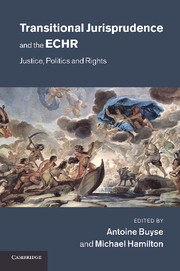Book contents
- Frontmatter
- Contents
- Foreword
- Acknowledgements
- 1 Introduction
- 2 Transitional emergency jurisprudence
- 3 Rights and victims, martyrs and memories
- 4 Confronting the consequences of authoritarianism and conflict
- 5 Freedom of religion and democratic transition
- 6 The truth, the past and the present
- 7 Transition, political loyalties and the order of the state
- 8 Transition, equality and non-discrimination
- 9 Closing the door on restitution
- 10 The Inter-American human rights system and transitional processes
- 11 The ???transitional??? jurisprudence of the African Commission on Human and Peoples??? Rights
- 12 Conclusions
- Index
- References
Foreword
Published online by Cambridge University Press: 07 September 2011
- Frontmatter
- Contents
- Foreword
- Acknowledgements
- 1 Introduction
- 2 Transitional emergency jurisprudence
- 3 Rights and victims, martyrs and memories
- 4 Confronting the consequences of authoritarianism and conflict
- 5 Freedom of religion and democratic transition
- 6 The truth, the past and the present
- 7 Transition, political loyalties and the order of the state
- 8 Transition, equality and non-discrimination
- 9 Closing the door on restitution
- 10 The Inter-American human rights system and transitional processes
- 11 The ???transitional??? jurisprudence of the African Commission on Human and Peoples??? Rights
- 12 Conclusions
- Index
- References
Summary
We are in a ‘global’ phase of transitional justice, marked by the proliferation of accountability mechanisms and processes at and across different levels – international, regional and domestic. What all of this means theoretically and practically is the central theme of this probing book. This is a work that questions prevailing assumptions, in particular regarding the European Court of Human Rights, through cross-cutting comparative research.
The point of departure is the current state of the field of transitional justice. The global phase has three dimensions: the globalization of the context; the concern for actors and interests beyond the state, both public and private; and the expansion, entrenchment and normalization of accountability as a response to conflict, wherever it occurs and whatever its forms. Moreover, this is a time in which courts are increasingly the institutions called upon to respond to conflict. The purposes of and hopes for transitional justice are extended beyond state building to advance the promotion and maintenance of human security.
- Type
- Chapter
- Information
- Transitional Jurisprudence and the ECHRJustice, Politics and Rights, pp. vii - xPublisher: Cambridge University PressPrint publication year: 2011

